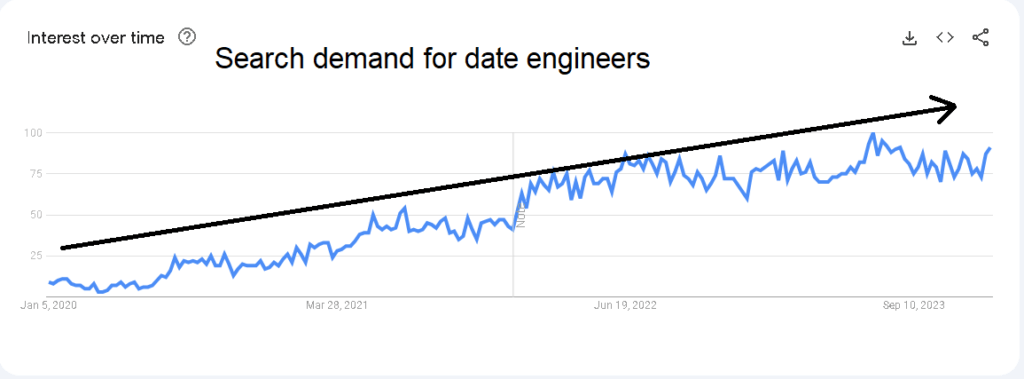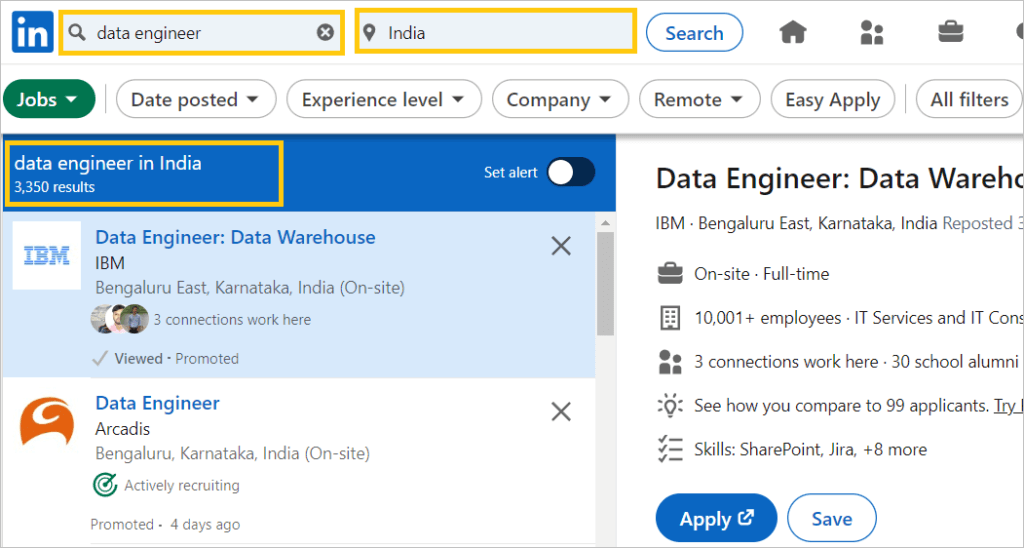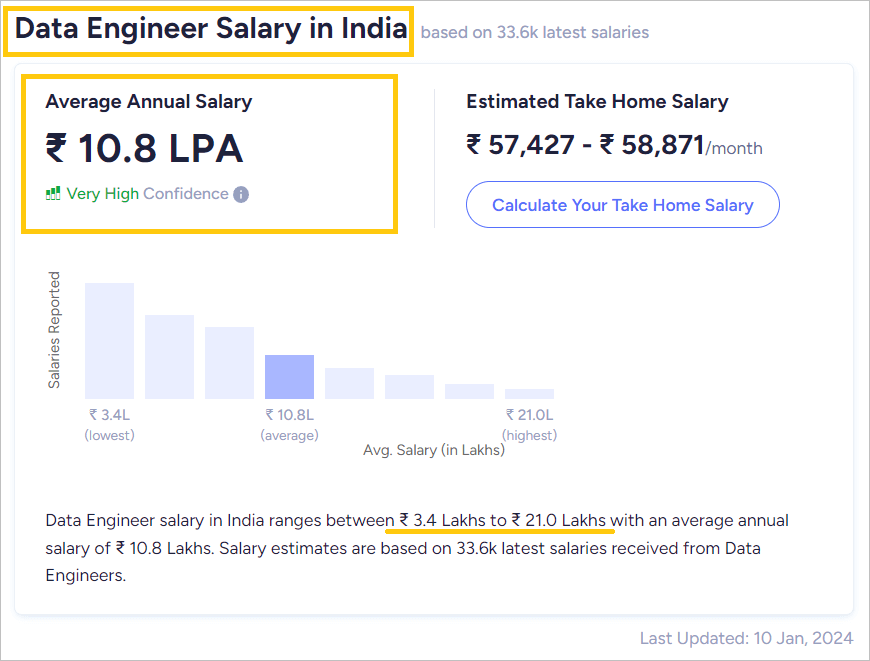Before starting a career in data engineering, you need to have clear answers about the career scope, job opportunities, required skills, and available resources for learning.
This is why I have created this guide with 4 key career paths for becoming a data engineer in 2024 and beyond.
Also, I have listed all related questions related to job outlook, salary scope, job demand and more so you can prepare your learning roadmap.
Is data engineering a good career path in 2024?
Yes, data engineering is a good career choice in 2024 because the demand for data engineers is on the rise, and it offers lucrative career options.
1. Industry demand: There has been a massive interest growth in the data engineering field for the past 5 years and will keep rising in the future.

2. Job availability: LinkedIn lists nearly 2000+ data engineer job vacancies across India. You can search different job boards, including Glassdoor, Indeed, and more, to find active job vacancies.

3. Career options: Data engineering is one of the fastest-growing occupations globally. You get numerous career options, including data analyst, data quality engineer, data moderator, database engineer, data scientist and data architect.

4. Salary ranges: As per Ambition Box, the average annual salary for a data engineer is ₹10.8 LPA in India.

What is data engineering?
Data engineering refers to designing and building systems that can collect and analyse raw data from different sources. This data is made usable for data scientists, analysts and executives to generate predictive models and show short-term and long-term trends.
The data engineering process comprises four key phases, including data gathering, data processing, data storing, and making data accessible to users.
What Do Data Engineers Do?
Data engineers can assist in designing, constructing, and maintaining systems that gather, analyse, manage, and organise raw data and transfer them into usable, high-quality data. The primary goal of data engineers is to make data accessible for organisations to use for evaluation and optimisation of their performance.
Listed below are some of their day-to-day tasks:
- Analysing and organising raw data
- Building improved data systems and pipelines
- Evaluating business requirements and objectives
- Understanding and interpreting short-term and long-term trends and patterns
- Performing complex data analysis and reporting results
- Gathering raw data from multiple sources and converting them in usable, high-quality data
- Finding ways to improve data quality and reliability
- Identifying different opportunities for data acquisition
Data Engineering Career Paths in 2024
1. Data engineer specialist
Data engineer specialists are experts in data engineering and are looking to specialise in a specific domain of data that is essential for any organisation, such as customer data or product data.
They also need to specialise in a certain capability of the data platform, like business intelligence, reliability engineering, or feature engineering.
Years of experience required: 5+ years
Role type: senior level
Job responsibilities:
- Project management, designing and building data models and optimal data pipeline architecture
- Process improvement, developing and maintaining data collection and processing systems, extracting data from multiple sources including client marketing databases, second and third-party data using Hadoop, SQL, spark, etc.
- Implementing data storage solutions across databases and data lakes, supporting specialists in new analytical proof of concepts and tool exploration projects
- Ensuring data consistency and accuracy using data validation and cleansing technique
- Collaborate with cross-functional teams to identify and address issues related to data, and with internal/external shareholders to manage data logistics
Key skills required:
- Relevant bachelor’s degree in computer science, informatics, statistics, information systems, and other relevant fields
- Proficiency in programming languages including Python, Java or Scala
- Experience with big data Technology, including Spark, Hadoop, and Kafka
- Knowledge in database management systems, including relational SQL and NoSQL databases, including Postgres and Cassandra
- Expert knowledge of metadata management and related tools
- Exposure to Azure data environment and familiarity with related tools
- Exhaustive experience in dimensional modelling for Data Marts
- Experience in working with data integration and ETL tools like Talend, Apache NiFi, and Informatica
- Experience with AWS cloud services including EC2, EMR, Redshift, RDS
- Experience with data pipeline and workflow management tools, including Airflow, Luigi, Azkaban, etc.
- Excellent communication and collaboration abilities
- Good problem-solving and analytical skills
Average annual salary: Average Base pay of ₹10 LPA – ₹18 LPA
2. Data engineer manager
A data engineer manager is a professional who oversees the development and use of multiple data systems within an organisation. They are responsible for effective data management, formulation of data collection techniques, implementation of secure data handling and analysis procedures, and establishing data sharing rules.
Years of experience required: 2-4 years
Role type: Senior level
Job responsibilities:
- Create and enforce policies and procedures for effective data management
- Managing and overseeing data professional employee teams
- Assign work, and monitor the completion of core duties, assignments and projects of the team
- Exercise control and authority over approving the work of all team members
- Coordinate and consult with internal senior Management on risks related to projects, concerns and financial issues
- Construct analytical systems including architectural directions, translate business issues into specific requirements to construct analytical solutions and identify data to support solutions
- Conduct feasibility study, capacity planning, and process redesigning or re-engineering of complex integration solution
- Establishing rules and procedures for data sharing
- Assisting in creating reports and data extraction
Key skills required:
- Bachelor’s degree in computer science or relevant degree with 5 years of progressive post-baccalaureate experience in IT consulting industry
- Experience with data administration and management functions
- Experience with scripting languages (Python, Java, C++, Scala)
- Understanding of modern digital databases and information system technologies
- Minimum 2 years of experience in utilizing ETL tools
- Familiarity with Agile delivery methodologies in converting business and functional requirements into technical designs
- Working knowledge of message queuing, highly scalable ‘big data’ data stores, and stream processing
- Developing large-scale ETL and DW solutions on cloud platforms or big data environment
- Strong project management, organisational and problem-solving skills
- Experience with data pipeline and work from management tools (Azkaban, Luigi, Airflow)
Average annual salary: ₹21 LPA – ₹35 LPA (Base Pay)
3. Data Architect
Data architects must specialise in developing and optimising database models that help store and retrieve company data. They must support clients to take control of their data and gain valuable insights out of it by defining reference architecture.
Years of experience required: 2+
Role type: mid to senior
Job responsibilities:
- Defining and prioritizing client data requirements
- Developing database solutions for storing and retrieving company data
- Collaborate with other architects, infrastructure and software professionals to define metadata layers, technical solutions and optimal integration within existing customer IT landscape
- Installing and configuring database systems to ensure better functionality
- Analysing structural requirements for model software and applications
- Migrating data from legacy software to new systems
- Designing conceptual and logical data models
- Collaborating with project teams to ensure data collection meets the data standards
- Developing best practices and frameworks for functional and integration test around data pipelines
- Translating complex business and technical challenges into logical data models
Key skills required:
- Bachelor’s degree in computer science, information technology or relevant fields
- Experience in building business intelligence designs and predictive Analytics
- Deep understanding of query and analytics tools
- Experience in using cloud-based software
- Proficiency in SQL, NoSQL, Python, ETL, and SQL server
- Understanding of machine learning and relational databases
- Strong collaboration and communication skills
- Fluency in using different programs and software
- Translate business requirements into data requests
- Experience in managing data sets and working with ETL and Data warehouse solutions.
Average annual salary: ₹17 LPA – ₹30 LPA (Base Pay)
4. Data Scientist
These professionals can manage big data using their mathematical, coding, and problem-solving skills and extract valuable insights. Data scientists can use this data to create better solutions that help organisations to meet their objectives and goals.
Years of experience required: 3+
Role type: mid to senior level
Job responsibilities:
- Accountable for delivery of advanced analytics solutions into Quantum’s core data assets
- Development and execution of a roadmap for the ongoing development of foundational data assets
- Project management including overseeing and delegating technical tasks among other data analysts
- Reviewing code and ensuring quality assurance of output produced by analysts
- Supporting the analytics lead with analytics architecture and solution designing
Key skills required:
- Previous experience as a data analyst or data scientist
- Expertise in data mining
- Knowledge of machine learning and operations research
- In-hand practice with business intelligence tools and data frameworks
- Having strong mathematical problem-solving and analytical skills
- Excellent communication presentation skills
- Bachelor’s degree in computer science, engineering, or relevant field
- Experience with querying databases and statistical computer languages like Python, and SQL
Average annual salary: ₹7 LPA – ₹19 LPA (base pay)
💡 Check out the tech career paths related to data engineering:
- Complete data science career paths
- Python career paths and job outlook
- Software engineering career paths
- Solutions architect career roadmap
- Data science career path roadmap
Job Outlook for Data Engineering
Within a decade from 2018 to 2028, the data engineering job growth rate is expected to be 21%. There will be lakhs of vacancies in this domain over the next decade.
The average salary for data engineers will also increase in the next five years. These professionals with a master’s degree in data engineering are expected to make an average yearly income of $117,324, and with a doctorate, it is around $127,334 annually.
According to research, it is estimated that by 2030, the global market for Big Data analytics will experience a growth rate of 30.7%, which means reaching a value of $346.24 billion.
Skills and prerequisites to become a data engineer
Data engineering is a broad and evolving field. There are numerous tools, frameworks and technologies used in data engineering, but mastering them all can be challenging. However, these few skills are essential to have while choosing the domain.
1. Programming skills
In data engineering, you might need to use technology like big data or machine learning. This requires you to have programming skills, including Python, C++, Scala, etc. You can start by learning Python, as it is a beginner-friendly language. Plus, Python can help you create data pipelines, integrations, automation, and analysis of data.
2. SQL skills
SQL skills involve understanding how to solve complex datasets using SQL dialects. You must know about relational and nonrelational database systems that can help you in data storage and retrieval.
- Relational database: A relation database is an organised collection of data elements in a tabular form, and a predefined connection links them.
- Non-relational database: It is also known as a non-tabular database that can come in different forms depending on the type of data model.
3. Data modelling techniques
Understanding the concept of data modelling is essential in data engineering. It serves as the blueprint for building scalable databases and warehouses. With data modelling techniques, you can execute efficient data pipelines that form the backbone of data engineering projects.
Popular data modelling techniques you must learn are:
- ER (Entity-Relationship) Model
- Hierarchical Model
- Network Model
- Relational Model
- Object-oriented Database Model
- Object-Relational Model
- Unified Modelling Language Class Diagrams
- Data Dictionary modelling technique
4. Expertise in ETL tools
Extract, Transform, and Load (ETL) tools help data engineers extract data from sources, convert them into analysable format and store that data in a data warehouse. Data engineers must have expertise in ETL tools to help companies analyse huge volumes of data relevant to a specific business challenge.
A few examples of popular ETL tools are:
- Informatica PowerCenter
- Apache Airflow
- IBM Infosphere Datastage
- Oracle Data Integrator
- Microsoft SQL Server Integration Services
- Talend Open Studio
5. Additional skills and prerequisites to become a data engineer
There are a few more technical and soft skills you must have to become a data engineer. These include:
- Knowledge of AWS cloud services
- Understanding distributed systems like Hadoop
- Acquiring machine learning skills
- Knowledge of application programming interface (API)
- Excellent presentation and communication skills
- Strong collaboration and critical thinking skills
The Future of Data Engineering— Will AI replace data engineers?
No, AI isn’t going to replace data engineers anytime soon.
While data engineers find AI to be a threat to their career path, AI aims to improve their work quality. It can automate your repetitive tasks but cannot perform tasks that require complex critical thinking and problem-solving abilities. Engineers need to customise their solutions consistently to fit with the changing business needs that AI is incapable of.
Even Though AI can analyse and process large volumes of data, they cannot innovate or think creatively. There are numerous other things that AI can’t do, like following ethics and regulations, communicating with the management and stakeholders, and adapting to new situations.
How Much Do Data Engineers Make?
Data engineering is one of the well-paid jobs in India and the US. They are being highly valued by companies across multiple domains. With hundreds of companies joining the Big Data bandwagon and generating valuable insights, demand for data-related jobs is increasing, as is the demand for data engineers. In the below tables, we have displayed the average data engineer salaries in the top 5 cities of India and the US.
The average data engineer salary in India by city (chart)
| City | Average base salary |
| Bangalore | ₹11.0 LPA |
| Hyderabad | ₹10.8 LPA |
| Pune | ₹9.6 LPA |
| Chennai | ₹10.5 LPA |
| Mumbai | ₹9.4 LPA |
The average data engineer salary in the US by city (chart)
| City | Average base salary |
| New York | $95k – $100k per year |
| Chicago | $88T – $100k per year |
| Houston | $86T – $100k per year |
| Phoenix | $88T – $100k per year |
| Philadelphia | $85T – $100k per year |
How Difficult is Data Engineering?
Lack of proper courses
Data engineering is an intense technical field that requires you to master using several tools and technologies constantly. It can be challenging for data engineers to keep pace with the rapid technical growth globally and learn the ins and outs of data engineering.
According to experts in this domain, there is a gap between the education provided during a course and the skills and experience required on the job. Most of the data engineering courses don’t include concepts that are needed in the real world over theoretical knowledge like data warehousing and data pipelines.
Not many opportunities for Junior Data Engineers
There are fewer opportunities available for junior data engineers in companies, which makes starting a career and acquiring skills difficult. Even though there are huge job vacancies for data engineers, you will find most of the companies are hiring engineers with 2-5 years of experience.
Requirement for a wide variety of skills
Data engineering is a vast area that requires so many skill sets from programming, SQL, data pipelines, DevOps, Cloud, data warehousing, etc. This often becomes difficult for aspiring candidates to get them all under their belts. Mostly, candidates suffer when they need to navigate through so many software options available today.
Data Engineering Career Opportunities in 2024
Data Engineering is a hot topic of the year and will stay in the news in the future. With the increased use of data, this domain has turned out to be a lucrative career option for students in Computer Science and engineering or other relevant fields.
1. Better opportunities
The Big Data Engineering services market is around $79.34 billion in 2024 and is forecasted to rise anywhere around $162.22 billion in 2029, rising at a CAGR of 15.38%. The largest players in the market are Cognizant, Infosys, Accenture, Amazon, Genpact, and Capgemini, who are currently hiring thousands of Data Engineers yearly.
2. Multiple job options
One can start their career from being a junior data engineer immediately after completing a certified course. This opens multiple other career doors, including data analysts, managers of data engineering, data architects, data scientists, and chief data officer. Plus, data engineers are now in demand in multiple sectors, including marketing, healthcare, e-commerce and finance.
3. High demand, low supply
Data Engineer can be the best career choice for you in 2024 as the demand for these professionals keeps increasing. According to research, the expected data engineering job growth rate is 21% from 2018 to 2028. However, the supply of data engineers isn’t that high, giving you better opportunities.
4. High salary
The average annual salary of a junior data engineer in India is around ₹4.4 LPA, which is nearly ₹30,923 – ₹ 32,224 per month. In the US, you can expect yearly pay of $1,25,173 as a junior data engineer and $1,77,033 as a senior data engineer.
Top data engineering career opportunities for 2024 include:
- Data engineer/Big Data Engineer
- Junior Data Engineer
- Senior Data Engineer
- Cloud Data Engineer
- Data Architect
- Data Warehouse Engineer
- Business Intelligence Engineer
Data Engineering course certifications to start your career
To help you get started in a data engineering career, I have listed some of the best data engineering course certification programs:
1. IBM Data Engineering Professional Certificate
This online certificate program makes you ready for a junior data engineer within 5 months, covering essential topics including Python, relational databases, Linux commands and shell scripting, ETL and data pipelines, data warehousing, machine learning, and more.
2. Data Engineering Course by Intellipaat
This is a free online course available on YouTube that covers almost every part of data engineering within 8 hours. You get a basic understanding of data engineering, along with tutorials on Apache Spark, AWS Elastic Map Reduce, Hadoop, Azure Data Factory, and more.
👉 Once you finish the course, enrol for Google’s Cloud Data Engineer Professional Certificate with a registration fee of $200.
3. Introduction to Designing Data Lakes on AWS by Coursera
If you want to start a career as a data engineer, you need to understand how to create data lakes. This certification course from Coursera will help you learn about data science, big data, analytics, scalable Data Lake, and Amazon web services within approximately 14 hours. Additionally, you will be enrolled in the AWS Cloud Solutions Architect Professional Certificate.
4. Data Warehouse Fundamentals for Beginners by Udemy
This certified course from Udemy helps you master the techniques to build a data warehouse for your organisation and apply key design principles of dimensional data modelling.
You can also learn how to combine various models in approaches to unify and load data within your data warehouse. It is one of the top courses for individuals willing to become data engineers, business analysts or database designers.
5. Edureka’s Data Engineering Course
This free data engineering course can clear your basics within 10 hours and train you on Hadoop, Apache Spark, Azure Data, etc. It can be a great starting point if you want to step into the data engineering domain.
👉 For certification, you can enrol for the Databricks Certified Data Engineer Professional exam for $200 and get a certificate on successful completion.
Is the data engineering career path a right fit for you?
Answer the following questions and calculate your scoring to self-assess whether data engineering is the right career path for you:
1. How comfortable are you with relational databases and SQL queries?
a) I am proficient in designing and querying databases (3)
b) I have basic SQL skills and can perform simple queries (2)
c) SQL and database concepts are unfamiliar or challenging to me (1)
2. Have you worked with ETL (Extract, Transform, Load) processes before?
a) I have hands-on experience designing and implementing ETL pipelines (3)
b) I understand the concept of ETL but haven’t implemented it hands-on (2)
c) ETL processes are unfamiliar or confusing to me (1)
3. How do you approach data quality and consistency in a project?
a) I am experienced in implementing data quality checks and ensuring consistency (3)
b) I understand the importance of data quality and consistency but haven’t implemented it extensively (2)
c) Data quality and consistency are not areas I’ve focused on (1)
4. Are you familiar with Big Data technologies such as Hadoop or Spark?
a) I have hands-on experience with Big Data technologies (3)
b) I have a basic understanding but limited hands-on experience (2)
c) Big Data technologies are unfamiliar or overwhelming to me (1)
5. How do you handle version control for your data engineering projects?
a) I use version control systems (e.g., Git) effectively in my projects (3)
b) I am aware of version control but have limited practical experience (2)
c) Version control is not part of my current workflow (1)
6. Have you worked with cloud-based data platforms (e.g., AWS, Azure, GCP)?
a) I have practical experience with cloud-based data platforms (3)
b) I have theoretical knowledge but limited hands-on experience (2)
c) Cloud platforms are unfamiliar or challenging for me (1)
7. How do you approach optimization in data processing and storage?
a) I actively optimize data processes and storage for efficiency (3)
b) I understand optimization concepts but may need more experience (2)
c) Optimization is not a priority in my current work (1)
Scoring Table:
- 18-21 points: Data engineering is likely a good fit for you. Your technical skills align well with the demands of the field.
- 12-17 points: You may have some technical aspects to work on, but a career in data engineering is feasible with additional learning and development.
- 7-11 points: Consider exploring other career options, as you may need to focus on enhancing your technical skills related to data engineering.
10Pie Editorial Team is a team of certified technical content writers and editors with experience in the technology field combined with expert insights. Learn more about our editorial process to ensure the quality and accuracy of the content published on our website.

